Analysis of Dacas v Brook Street Bureau UK Employment Law Case
VerifiedAdded on 2023/06/04
|11
|3234
|114
Case Study
AI Summary
This case study provides an in-depth analysis of the Dacas v Brook Street Bureau (UK) Ltd [2004] EWCA Civ 217 case, involving Patricia Dacas, an employment agency (Brook Street Bureau), and Wandsworth Borough Council. The case revolves around Mrs. Dacas' claim for prejudicial dismissal after working as a cleaner for the council through the employment agency. The Employment Tribunal initially ruled against Dacas, but the Employment Appeal Tribunal later found errors in law. Key issues include the nature of the employment relationship, the control exerted by the council, and the responsibilities of the employment agency. The Court of Appeal ultimately addressed the question of whether an employment agreement existed between Mrs. Dacas and the agency or the council, considering relevant employment law, legislation, and previous cases such as Astbury v Gist EAT UKEAT/0619/06/DA.
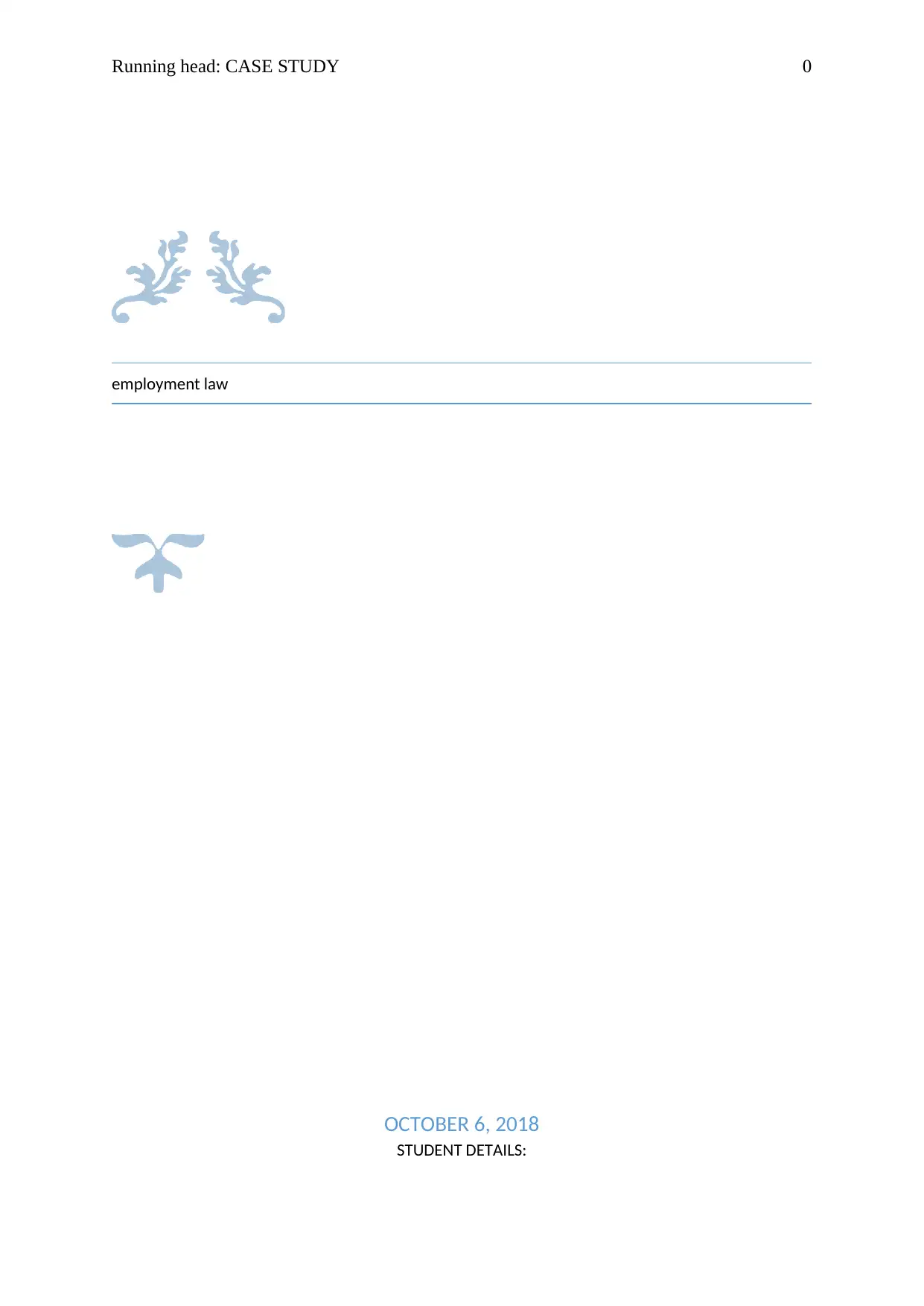
Running head: CASE STUDY 0
employment law
OCTOBER 6, 2018
STUDENT DETAILS:
employment law
OCTOBER 6, 2018
STUDENT DETAILS:
Paraphrase This Document
Need a fresh take? Get an instant paraphrase of this document with our AI Paraphraser
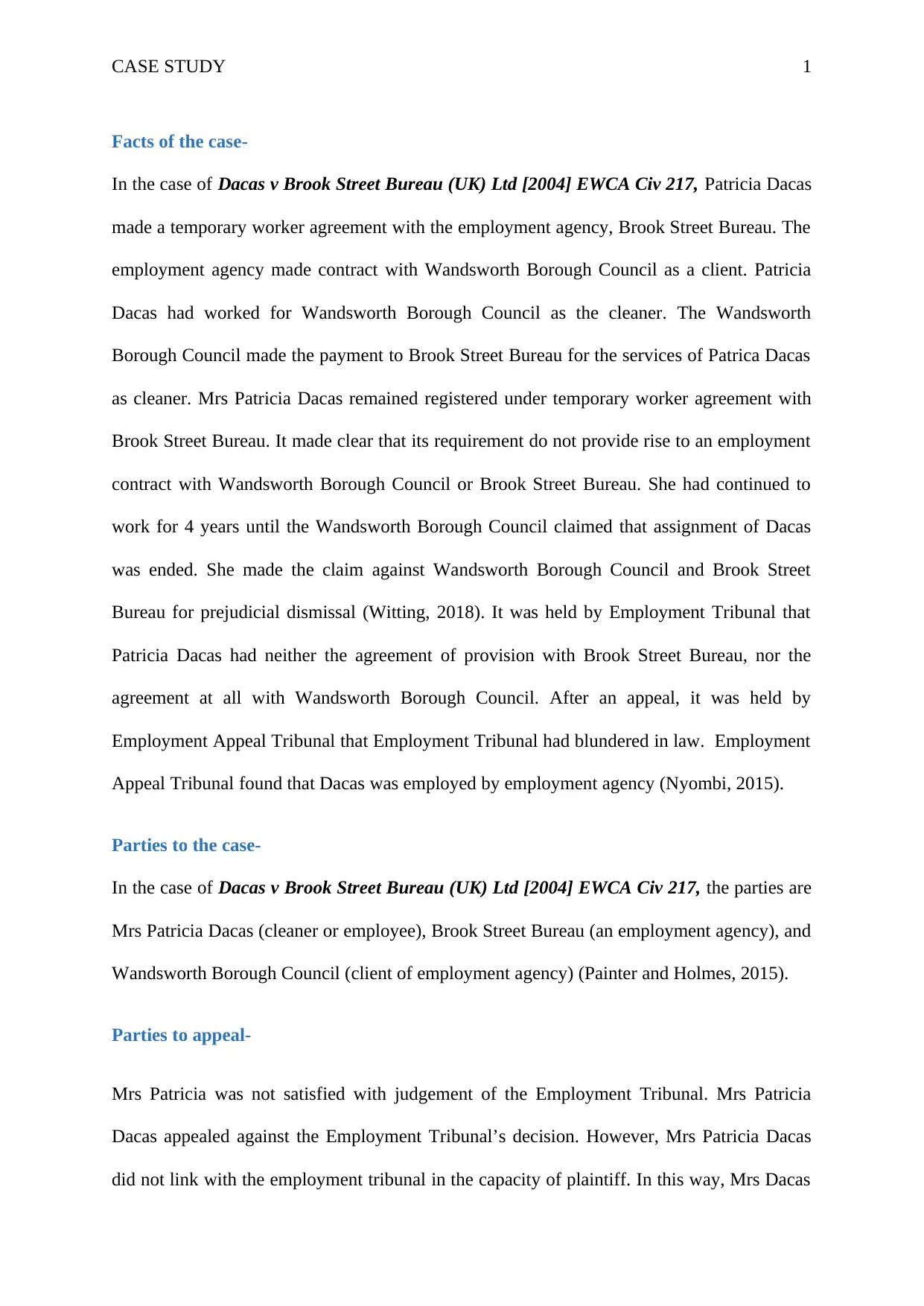
CASE STUDY 1
Facts of the case-
In the case of Dacas v Brook Street Bureau (UK) Ltd [2004] EWCA Civ 217, Patricia Dacas
made a temporary worker agreement with the employment agency, Brook Street Bureau. The
employment agency made contract with Wandsworth Borough Council as a client. Patricia
Dacas had worked for Wandsworth Borough Council as the cleaner. The Wandsworth
Borough Council made the payment to Brook Street Bureau for the services of Patrica Dacas
as cleaner. Mrs Patricia Dacas remained registered under temporary worker agreement with
Brook Street Bureau. It made clear that its requirement do not provide rise to an employment
contract with Wandsworth Borough Council or Brook Street Bureau. She had continued to
work for 4 years until the Wandsworth Borough Council claimed that assignment of Dacas
was ended. She made the claim against Wandsworth Borough Council and Brook Street
Bureau for prejudicial dismissal (Witting, 2018). It was held by Employment Tribunal that
Patricia Dacas had neither the agreement of provision with Brook Street Bureau, nor the
agreement at all with Wandsworth Borough Council. After an appeal, it was held by
Employment Appeal Tribunal that Employment Tribunal had blundered in law. Employment
Appeal Tribunal found that Dacas was employed by employment agency (Nyombi, 2015).
Parties to the case-
In the case of Dacas v Brook Street Bureau (UK) Ltd [2004] EWCA Civ 217, the parties are
Mrs Patricia Dacas (cleaner or employee), Brook Street Bureau (an employment agency), and
Wandsworth Borough Council (client of employment agency) (Painter and Holmes, 2015).
Parties to appeal-
Mrs Patricia was not satisfied with judgement of the Employment Tribunal. Mrs Patricia
Dacas appealed against the Employment Tribunal’s decision. However, Mrs Patricia Dacas
did not link with the employment tribunal in the capacity of plaintiff. In this way, Mrs Dacas
Facts of the case-
In the case of Dacas v Brook Street Bureau (UK) Ltd [2004] EWCA Civ 217, Patricia Dacas
made a temporary worker agreement with the employment agency, Brook Street Bureau. The
employment agency made contract with Wandsworth Borough Council as a client. Patricia
Dacas had worked for Wandsworth Borough Council as the cleaner. The Wandsworth
Borough Council made the payment to Brook Street Bureau for the services of Patrica Dacas
as cleaner. Mrs Patricia Dacas remained registered under temporary worker agreement with
Brook Street Bureau. It made clear that its requirement do not provide rise to an employment
contract with Wandsworth Borough Council or Brook Street Bureau. She had continued to
work for 4 years until the Wandsworth Borough Council claimed that assignment of Dacas
was ended. She made the claim against Wandsworth Borough Council and Brook Street
Bureau for prejudicial dismissal (Witting, 2018). It was held by Employment Tribunal that
Patricia Dacas had neither the agreement of provision with Brook Street Bureau, nor the
agreement at all with Wandsworth Borough Council. After an appeal, it was held by
Employment Appeal Tribunal that Employment Tribunal had blundered in law. Employment
Appeal Tribunal found that Dacas was employed by employment agency (Nyombi, 2015).
Parties to the case-
In the case of Dacas v Brook Street Bureau (UK) Ltd [2004] EWCA Civ 217, the parties are
Mrs Patricia Dacas (cleaner or employee), Brook Street Bureau (an employment agency), and
Wandsworth Borough Council (client of employment agency) (Painter and Holmes, 2015).
Parties to appeal-
Mrs Patricia was not satisfied with judgement of the Employment Tribunal. Mrs Patricia
Dacas appealed against the Employment Tribunal’s decision. However, Mrs Patricia Dacas
did not link with the employment tribunal in the capacity of plaintiff. In this way, Mrs Dacas
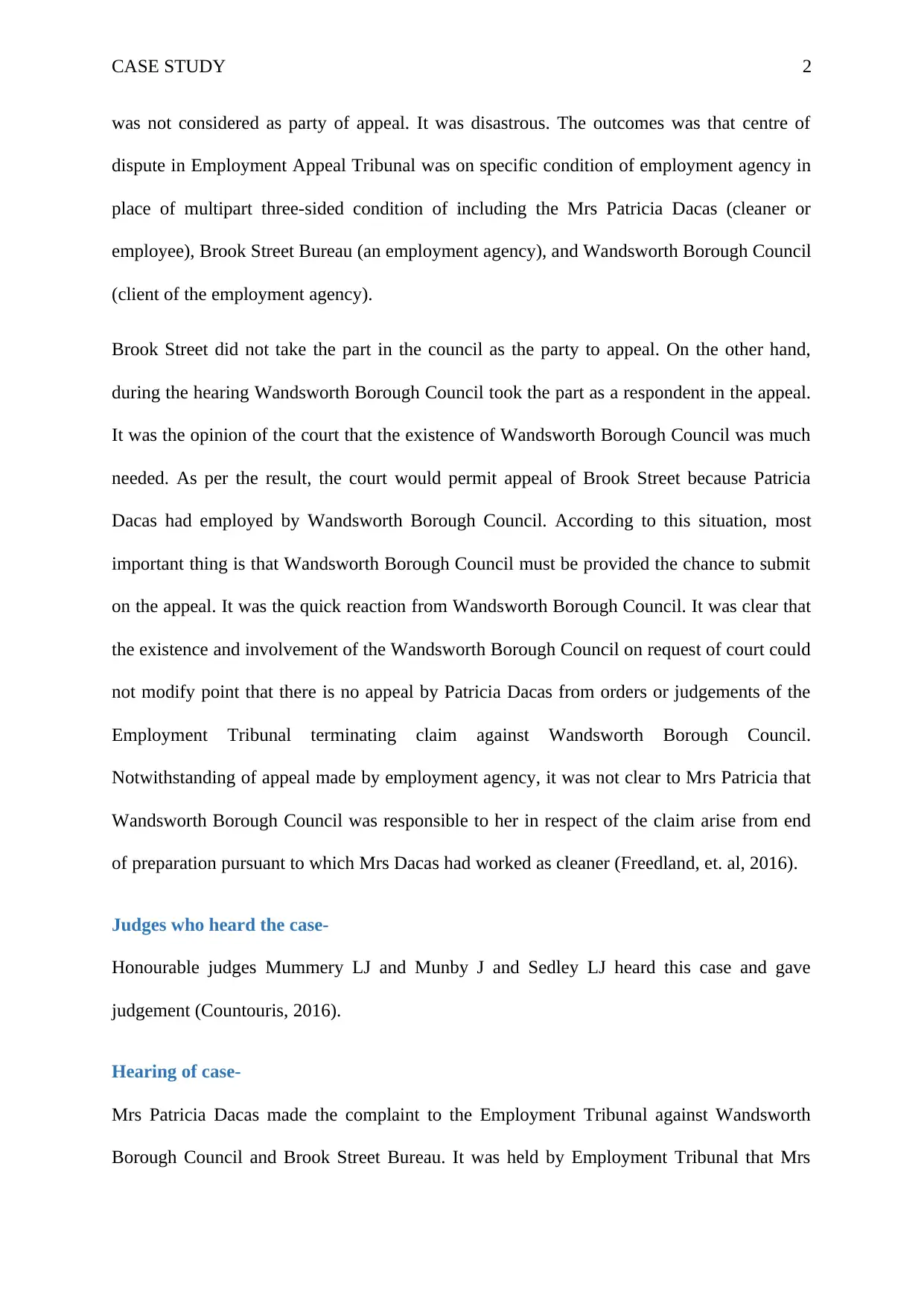
CASE STUDY 2
was not considered as party of appeal. It was disastrous. The outcomes was that centre of
dispute in Employment Appeal Tribunal was on specific condition of employment agency in
place of multipart three-sided condition of including the Mrs Patricia Dacas (cleaner or
employee), Brook Street Bureau (an employment agency), and Wandsworth Borough Council
(client of the employment agency).
Brook Street did not take the part in the council as the party to appeal. On the other hand,
during the hearing Wandsworth Borough Council took the part as a respondent in the appeal.
It was the opinion of the court that the existence of Wandsworth Borough Council was much
needed. As per the result, the court would permit appeal of Brook Street because Patricia
Dacas had employed by Wandsworth Borough Council. According to this situation, most
important thing is that Wandsworth Borough Council must be provided the chance to submit
on the appeal. It was the quick reaction from Wandsworth Borough Council. It was clear that
the existence and involvement of the Wandsworth Borough Council on request of court could
not modify point that there is no appeal by Patricia Dacas from orders or judgements of the
Employment Tribunal terminating claim against Wandsworth Borough Council.
Notwithstanding of appeal made by employment agency, it was not clear to Mrs Patricia that
Wandsworth Borough Council was responsible to her in respect of the claim arise from end
of preparation pursuant to which Mrs Dacas had worked as cleaner (Freedland, et. al, 2016).
Judges who heard the case-
Honourable judges Mummery LJ and Munby J and Sedley LJ heard this case and gave
judgement (Countouris, 2016).
Hearing of case-
Mrs Patricia Dacas made the complaint to the Employment Tribunal against Wandsworth
Borough Council and Brook Street Bureau. It was held by Employment Tribunal that Mrs
was not considered as party of appeal. It was disastrous. The outcomes was that centre of
dispute in Employment Appeal Tribunal was on specific condition of employment agency in
place of multipart three-sided condition of including the Mrs Patricia Dacas (cleaner or
employee), Brook Street Bureau (an employment agency), and Wandsworth Borough Council
(client of the employment agency).
Brook Street did not take the part in the council as the party to appeal. On the other hand,
during the hearing Wandsworth Borough Council took the part as a respondent in the appeal.
It was the opinion of the court that the existence of Wandsworth Borough Council was much
needed. As per the result, the court would permit appeal of Brook Street because Patricia
Dacas had employed by Wandsworth Borough Council. According to this situation, most
important thing is that Wandsworth Borough Council must be provided the chance to submit
on the appeal. It was the quick reaction from Wandsworth Borough Council. It was clear that
the existence and involvement of the Wandsworth Borough Council on request of court could
not modify point that there is no appeal by Patricia Dacas from orders or judgements of the
Employment Tribunal terminating claim against Wandsworth Borough Council.
Notwithstanding of appeal made by employment agency, it was not clear to Mrs Patricia that
Wandsworth Borough Council was responsible to her in respect of the claim arise from end
of preparation pursuant to which Mrs Dacas had worked as cleaner (Freedland, et. al, 2016).
Judges who heard the case-
Honourable judges Mummery LJ and Munby J and Sedley LJ heard this case and gave
judgement (Countouris, 2016).
Hearing of case-
Mrs Patricia Dacas made the complaint to the Employment Tribunal against Wandsworth
Borough Council and Brook Street Bureau. It was held by Employment Tribunal that Mrs
⊘ This is a preview!⊘
Do you want full access?
Subscribe today to unlock all pages.

Trusted by 1+ million students worldwide
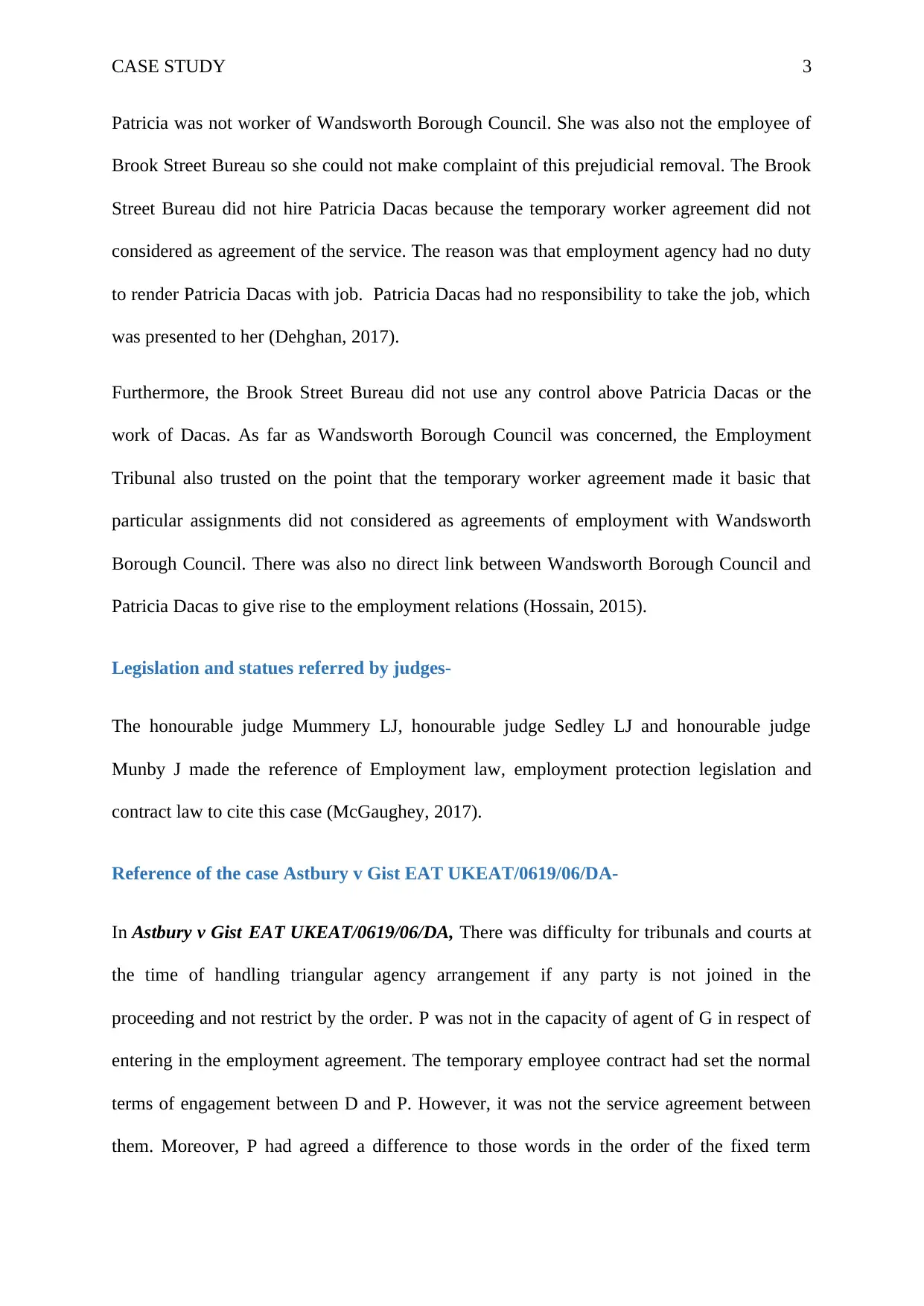
CASE STUDY 3
Patricia was not worker of Wandsworth Borough Council. She was also not the employee of
Brook Street Bureau so she could not make complaint of this prejudicial removal. The Brook
Street Bureau did not hire Patricia Dacas because the temporary worker agreement did not
considered as agreement of the service. The reason was that employment agency had no duty
to render Patricia Dacas with job. Patricia Dacas had no responsibility to take the job, which
was presented to her (Dehghan, 2017).
Furthermore, the Brook Street Bureau did not use any control above Patricia Dacas or the
work of Dacas. As far as Wandsworth Borough Council was concerned, the Employment
Tribunal also trusted on the point that the temporary worker agreement made it basic that
particular assignments did not considered as agreements of employment with Wandsworth
Borough Council. There was also no direct link between Wandsworth Borough Council and
Patricia Dacas to give rise to the employment relations (Hossain, 2015).
Legislation and statues referred by judges-
The honourable judge Mummery LJ, honourable judge Sedley LJ and honourable judge
Munby J made the reference of Employment law, employment protection legislation and
contract law to cite this case (McGaughey, 2017).
Reference of the case Astbury v Gist EAT UKEAT/0619/06/DA-
In Astbury v Gist EAT UKEAT/0619/06/DA, There was difficulty for tribunals and courts at
the time of handling triangular agency arrangement if any party is not joined in the
proceeding and not restrict by the order. P was not in the capacity of agent of G in respect of
entering in the employment agreement. The temporary employee contract had set the normal
terms of engagement between D and P. However, it was not the service agreement between
them. Moreover, P had agreed a difference to those words in the order of the fixed term
Patricia was not worker of Wandsworth Borough Council. She was also not the employee of
Brook Street Bureau so she could not make complaint of this prejudicial removal. The Brook
Street Bureau did not hire Patricia Dacas because the temporary worker agreement did not
considered as agreement of the service. The reason was that employment agency had no duty
to render Patricia Dacas with job. Patricia Dacas had no responsibility to take the job, which
was presented to her (Dehghan, 2017).
Furthermore, the Brook Street Bureau did not use any control above Patricia Dacas or the
work of Dacas. As far as Wandsworth Borough Council was concerned, the Employment
Tribunal also trusted on the point that the temporary worker agreement made it basic that
particular assignments did not considered as agreements of employment with Wandsworth
Borough Council. There was also no direct link between Wandsworth Borough Council and
Patricia Dacas to give rise to the employment relations (Hossain, 2015).
Legislation and statues referred by judges-
The honourable judge Mummery LJ, honourable judge Sedley LJ and honourable judge
Munby J made the reference of Employment law, employment protection legislation and
contract law to cite this case (McGaughey, 2017).
Reference of the case Astbury v Gist EAT UKEAT/0619/06/DA-
In Astbury v Gist EAT UKEAT/0619/06/DA, There was difficulty for tribunals and courts at
the time of handling triangular agency arrangement if any party is not joined in the
proceeding and not restrict by the order. P was not in the capacity of agent of G in respect of
entering in the employment agreement. The temporary employee contract had set the normal
terms of engagement between D and P. However, it was not the service agreement between
them. Moreover, P had agreed a difference to those words in the order of the fixed term
Paraphrase This Document
Need a fresh take? Get an instant paraphrase of this document with our AI Paraphraser
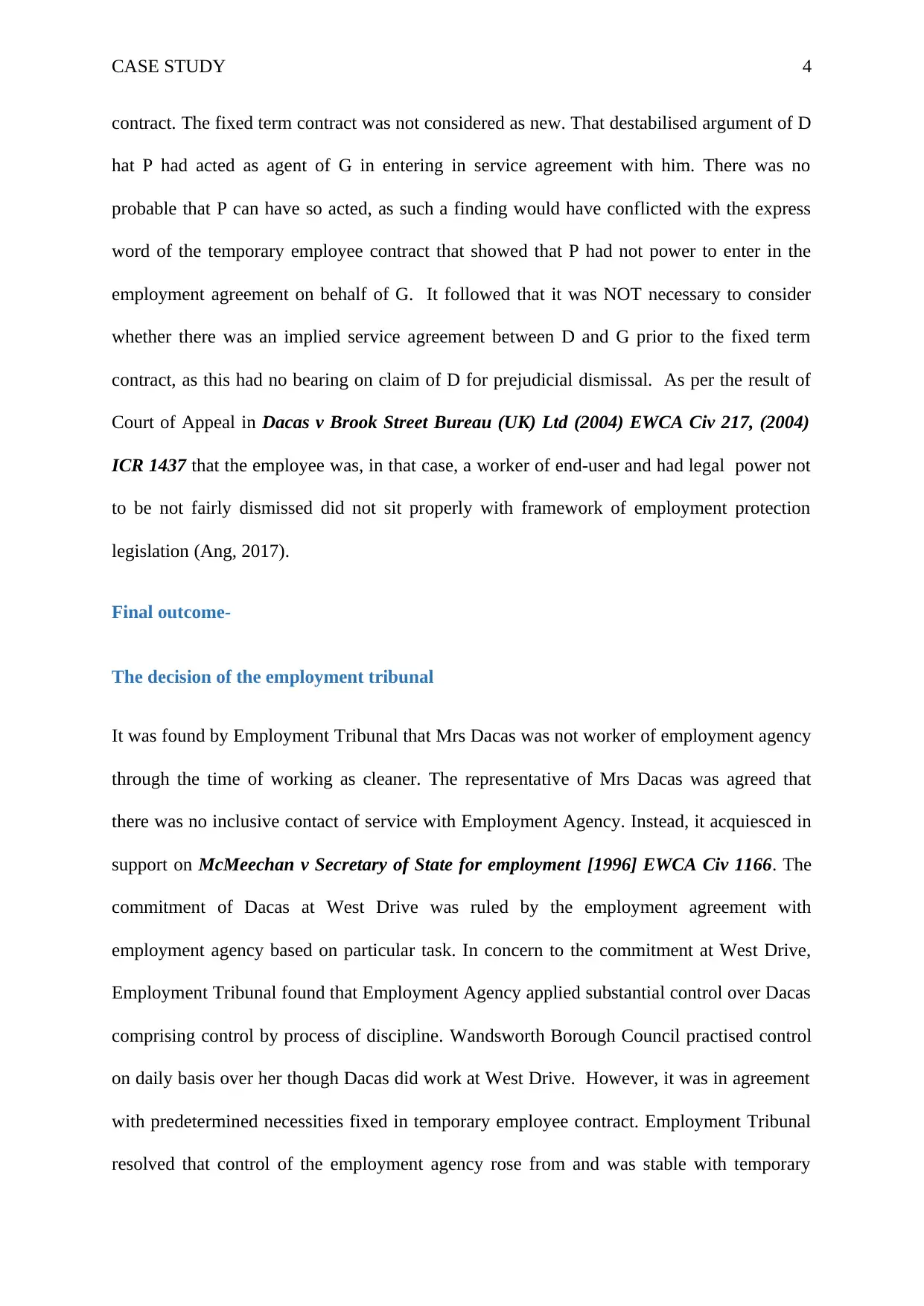
CASE STUDY 4
contract. The fixed term contract was not considered as new. That destabilised argument of D
hat P had acted as agent of G in entering in service agreement with him. There was no
probable that P can have so acted, as such a finding would have conflicted with the express
word of the temporary employee contract that showed that P had not power to enter in the
employment agreement on behalf of G. It followed that it was NOT necessary to consider
whether there was an implied service agreement between D and G prior to the fixed term
contract, as this had no bearing on claim of D for prejudicial dismissal. As per the result of
Court of Appeal in Dacas v Brook Street Bureau (UK) Ltd (2004) EWCA Civ 217, (2004)
ICR 1437 that the employee was, in that case, a worker of end-user and had legal power not
to be not fairly dismissed did not sit properly with framework of employment protection
legislation (Ang, 2017).
Final outcome-
The decision of the employment tribunal
It was found by Employment Tribunal that Mrs Dacas was not worker of employment agency
through the time of working as cleaner. The representative of Mrs Dacas was agreed that
there was no inclusive contact of service with Employment Agency. Instead, it acquiesced in
support on McMeechan v Secretary of State for employment [1996] EWCA Civ 1166. The
commitment of Dacas at West Drive was ruled by the employment agreement with
employment agency based on particular task. In concern to the commitment at West Drive,
Employment Tribunal found that Employment Agency applied substantial control over Dacas
comprising control by process of discipline. Wandsworth Borough Council practised control
on daily basis over her though Dacas did work at West Drive. However, it was in agreement
with predetermined necessities fixed in temporary employee contract. Employment Tribunal
resolved that control of the employment agency rose from and was stable with temporary
contract. The fixed term contract was not considered as new. That destabilised argument of D
hat P had acted as agent of G in entering in service agreement with him. There was no
probable that P can have so acted, as such a finding would have conflicted with the express
word of the temporary employee contract that showed that P had not power to enter in the
employment agreement on behalf of G. It followed that it was NOT necessary to consider
whether there was an implied service agreement between D and G prior to the fixed term
contract, as this had no bearing on claim of D for prejudicial dismissal. As per the result of
Court of Appeal in Dacas v Brook Street Bureau (UK) Ltd (2004) EWCA Civ 217, (2004)
ICR 1437 that the employee was, in that case, a worker of end-user and had legal power not
to be not fairly dismissed did not sit properly with framework of employment protection
legislation (Ang, 2017).
Final outcome-
The decision of the employment tribunal
It was found by Employment Tribunal that Mrs Dacas was not worker of employment agency
through the time of working as cleaner. The representative of Mrs Dacas was agreed that
there was no inclusive contact of service with Employment Agency. Instead, it acquiesced in
support on McMeechan v Secretary of State for employment [1996] EWCA Civ 1166. The
commitment of Dacas at West Drive was ruled by the employment agreement with
employment agency based on particular task. In concern to the commitment at West Drive,
Employment Tribunal found that Employment Agency applied substantial control over Dacas
comprising control by process of discipline. Wandsworth Borough Council practised control
on daily basis over her though Dacas did work at West Drive. However, it was in agreement
with predetermined necessities fixed in temporary employee contract. Employment Tribunal
resolved that control of the employment agency rose from and was stable with temporary
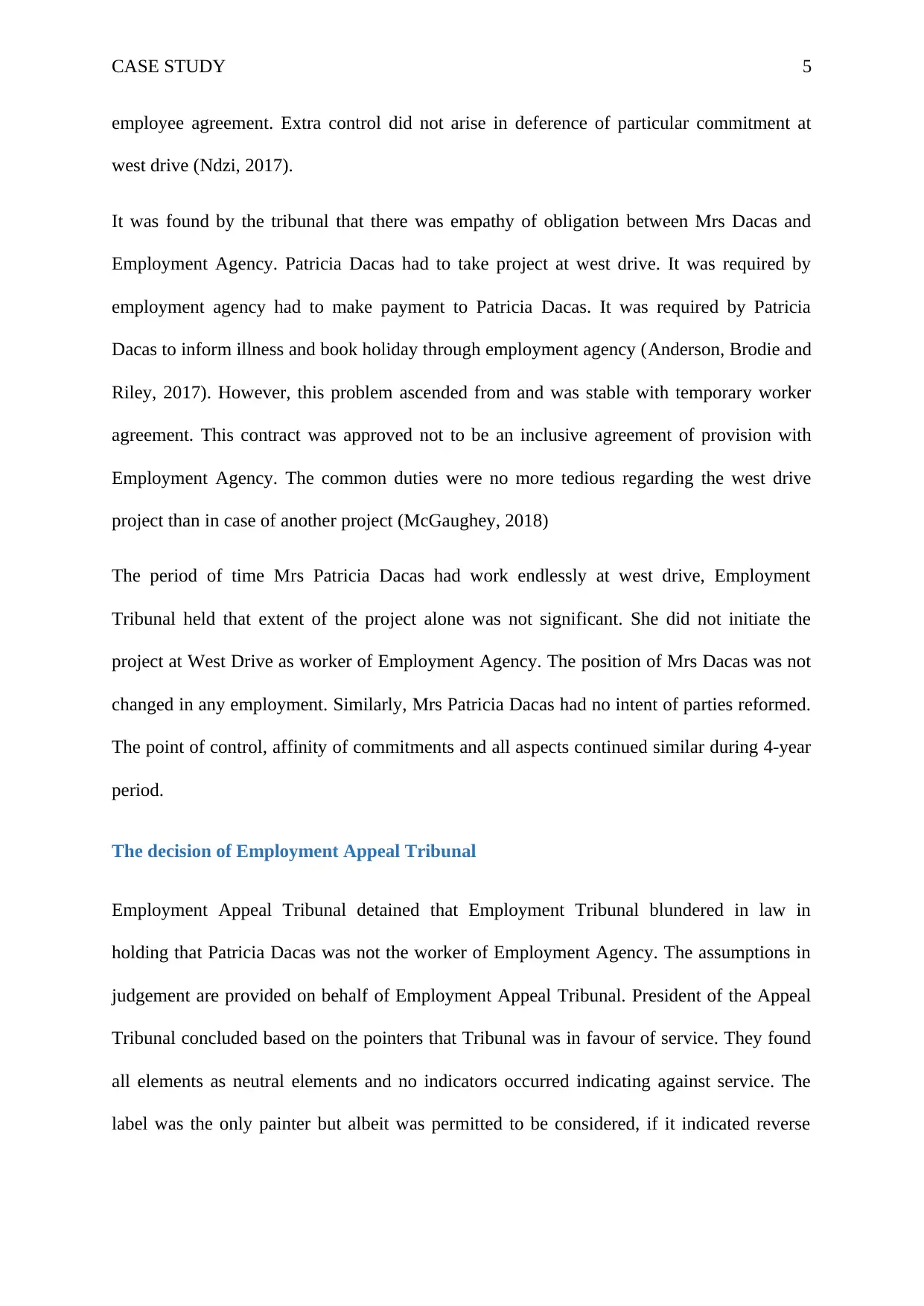
CASE STUDY 5
employee agreement. Extra control did not arise in deference of particular commitment at
west drive (Ndzi, 2017).
It was found by the tribunal that there was empathy of obligation between Mrs Dacas and
Employment Agency. Patricia Dacas had to take project at west drive. It was required by
employment agency had to make payment to Patricia Dacas. It was required by Patricia
Dacas to inform illness and book holiday through employment agency (Anderson, Brodie and
Riley, 2017). However, this problem ascended from and was stable with temporary worker
agreement. This contract was approved not to be an inclusive agreement of provision with
Employment Agency. The common duties were no more tedious regarding the west drive
project than in case of another project (McGaughey, 2018)
The period of time Mrs Patricia Dacas had work endlessly at west drive, Employment
Tribunal held that extent of the project alone was not significant. She did not initiate the
project at West Drive as worker of Employment Agency. The position of Mrs Dacas was not
changed in any employment. Similarly, Mrs Patricia Dacas had no intent of parties reformed.
The point of control, affinity of commitments and all aspects continued similar during 4-year
period.
The decision of Employment Appeal Tribunal
Employment Appeal Tribunal detained that Employment Tribunal blundered in law in
holding that Patricia Dacas was not the worker of Employment Agency. The assumptions in
judgement are provided on behalf of Employment Appeal Tribunal. President of the Appeal
Tribunal concluded based on the pointers that Tribunal was in favour of service. They found
all elements as neutral elements and no indicators occurred indicating against service. The
label was the only painter but albeit was permitted to be considered, if it indicated reverse
employee agreement. Extra control did not arise in deference of particular commitment at
west drive (Ndzi, 2017).
It was found by the tribunal that there was empathy of obligation between Mrs Dacas and
Employment Agency. Patricia Dacas had to take project at west drive. It was required by
employment agency had to make payment to Patricia Dacas. It was required by Patricia
Dacas to inform illness and book holiday through employment agency (Anderson, Brodie and
Riley, 2017). However, this problem ascended from and was stable with temporary worker
agreement. This contract was approved not to be an inclusive agreement of provision with
Employment Agency. The common duties were no more tedious regarding the west drive
project than in case of another project (McGaughey, 2018)
The period of time Mrs Patricia Dacas had work endlessly at west drive, Employment
Tribunal held that extent of the project alone was not significant. She did not initiate the
project at West Drive as worker of Employment Agency. The position of Mrs Dacas was not
changed in any employment. Similarly, Mrs Patricia Dacas had no intent of parties reformed.
The point of control, affinity of commitments and all aspects continued similar during 4-year
period.
The decision of Employment Appeal Tribunal
Employment Appeal Tribunal detained that Employment Tribunal blundered in law in
holding that Patricia Dacas was not the worker of Employment Agency. The assumptions in
judgement are provided on behalf of Employment Appeal Tribunal. President of the Appeal
Tribunal concluded based on the pointers that Tribunal was in favour of service. They found
all elements as neutral elements and no indicators occurred indicating against service. The
label was the only painter but albeit was permitted to be considered, if it indicated reverse
⊘ This is a preview!⊘
Do you want full access?
Subscribe today to unlock all pages.

Trusted by 1+ million students worldwide
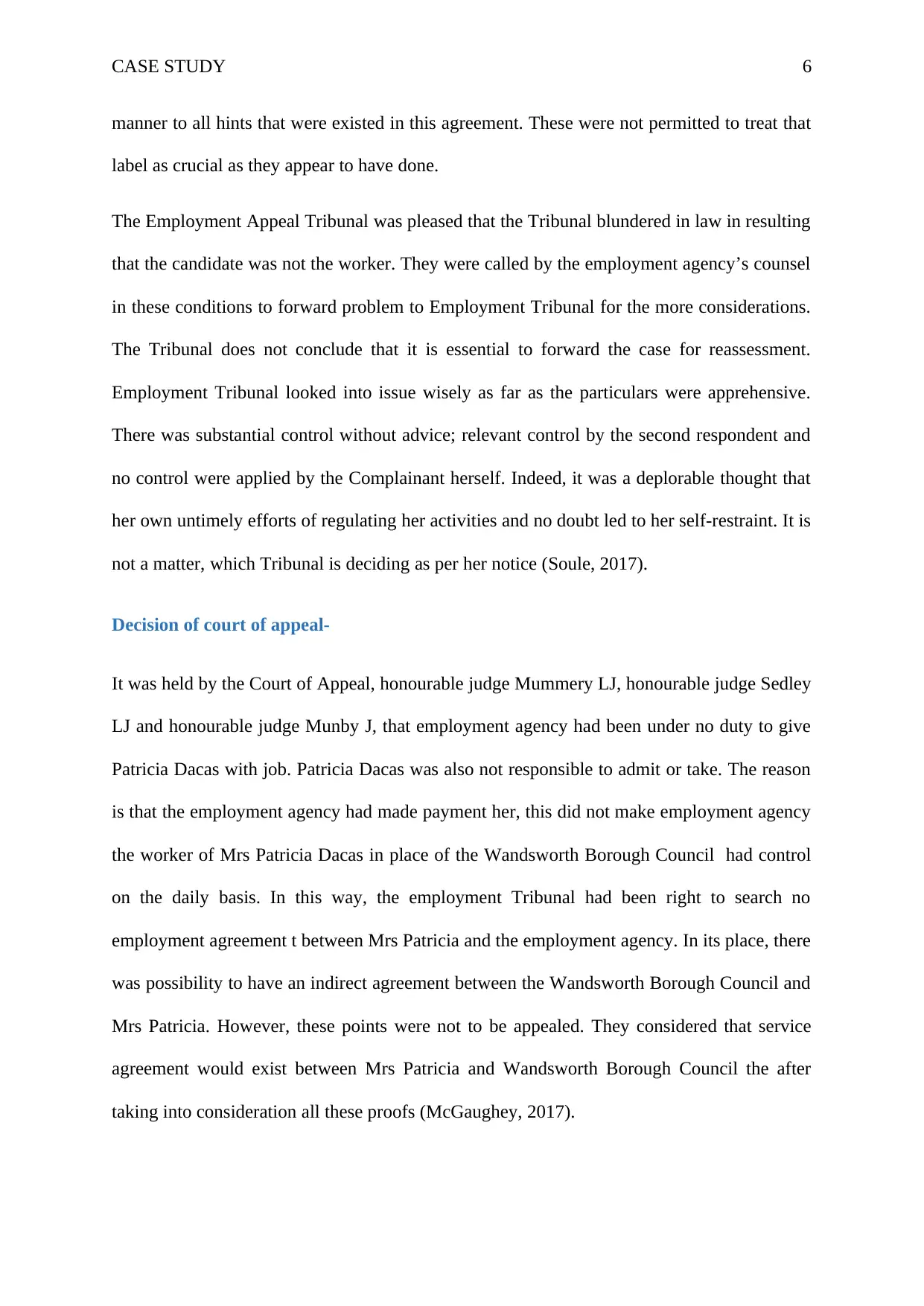
CASE STUDY 6
manner to all hints that were existed in this agreement. These were not permitted to treat that
label as crucial as they appear to have done.
The Employment Appeal Tribunal was pleased that the Tribunal blundered in law in resulting
that the candidate was not the worker. They were called by the employment agency’s counsel
in these conditions to forward problem to Employment Tribunal for the more considerations.
The Tribunal does not conclude that it is essential to forward the case for reassessment.
Employment Tribunal looked into issue wisely as far as the particulars were apprehensive.
There was substantial control without advice; relevant control by the second respondent and
no control were applied by the Complainant herself. Indeed, it was a deplorable thought that
her own untimely efforts of regulating her activities and no doubt led to her self-restraint. It is
not a matter, which Tribunal is deciding as per her notice (Soule, 2017).
Decision of court of appeal-
It was held by the Court of Appeal, honourable judge Mummery LJ, honourable judge Sedley
LJ and honourable judge Munby J, that employment agency had been under no duty to give
Patricia Dacas with job. Patricia Dacas was also not responsible to admit or take. The reason
is that the employment agency had made payment her, this did not make employment agency
the worker of Mrs Patricia Dacas in place of the Wandsworth Borough Council had control
on the daily basis. In this way, the employment Tribunal had been right to search no
employment agreement t between Mrs Patricia and the employment agency. In its place, there
was possibility to have an indirect agreement between the Wandsworth Borough Council and
Mrs Patricia. However, these points were not to be appealed. They considered that service
agreement would exist between Mrs Patricia and Wandsworth Borough Council the after
taking into consideration all these proofs (McGaughey, 2017).
manner to all hints that were existed in this agreement. These were not permitted to treat that
label as crucial as they appear to have done.
The Employment Appeal Tribunal was pleased that the Tribunal blundered in law in resulting
that the candidate was not the worker. They were called by the employment agency’s counsel
in these conditions to forward problem to Employment Tribunal for the more considerations.
The Tribunal does not conclude that it is essential to forward the case for reassessment.
Employment Tribunal looked into issue wisely as far as the particulars were apprehensive.
There was substantial control without advice; relevant control by the second respondent and
no control were applied by the Complainant herself. Indeed, it was a deplorable thought that
her own untimely efforts of regulating her activities and no doubt led to her self-restraint. It is
not a matter, which Tribunal is deciding as per her notice (Soule, 2017).
Decision of court of appeal-
It was held by the Court of Appeal, honourable judge Mummery LJ, honourable judge Sedley
LJ and honourable judge Munby J, that employment agency had been under no duty to give
Patricia Dacas with job. Patricia Dacas was also not responsible to admit or take. The reason
is that the employment agency had made payment her, this did not make employment agency
the worker of Mrs Patricia Dacas in place of the Wandsworth Borough Council had control
on the daily basis. In this way, the employment Tribunal had been right to search no
employment agreement t between Mrs Patricia and the employment agency. In its place, there
was possibility to have an indirect agreement between the Wandsworth Borough Council and
Mrs Patricia. However, these points were not to be appealed. They considered that service
agreement would exist between Mrs Patricia and Wandsworth Borough Council the after
taking into consideration all these proofs (McGaughey, 2017).
Paraphrase This Document
Need a fresh take? Get an instant paraphrase of this document with our AI Paraphraser
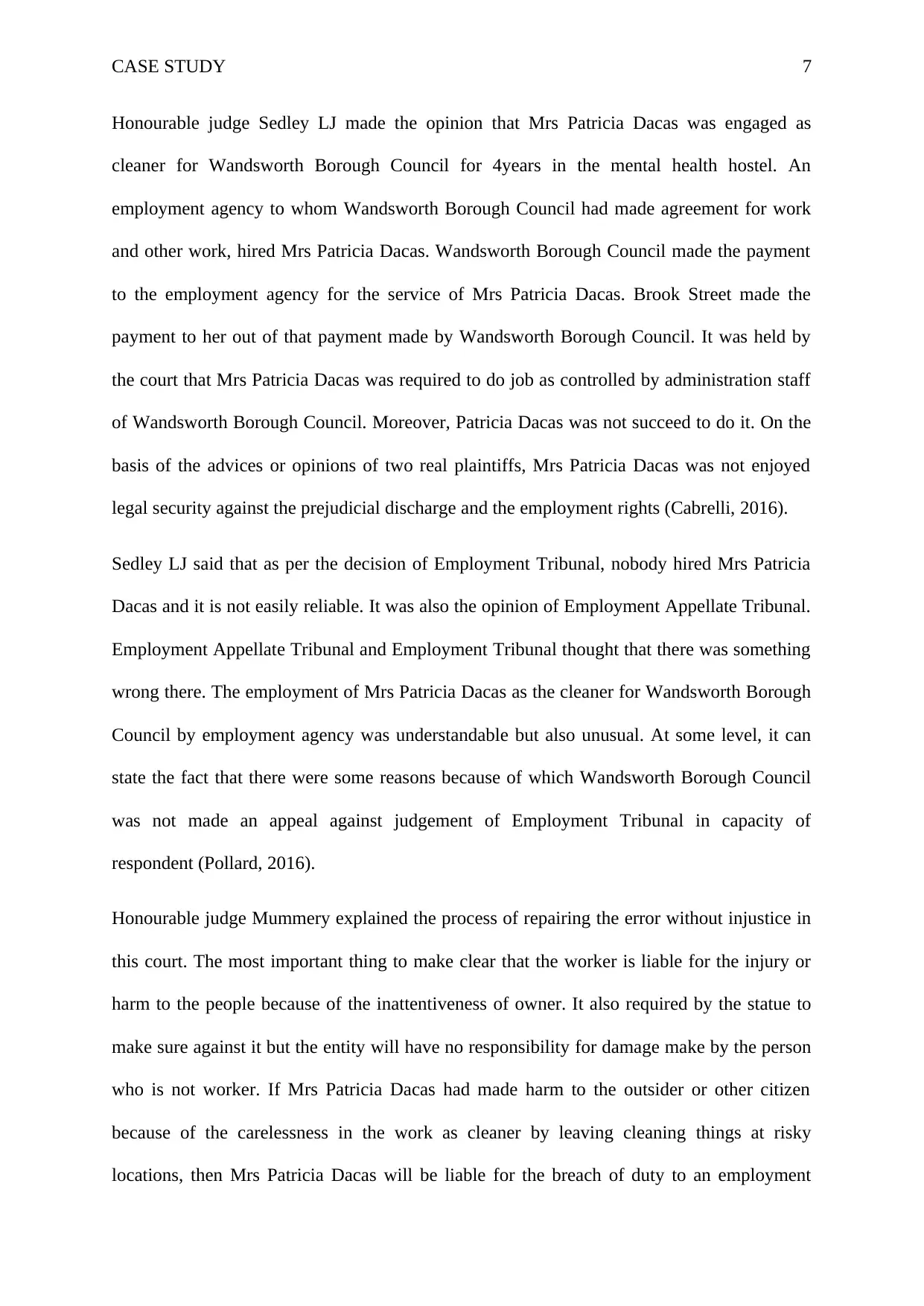
CASE STUDY 7
Honourable judge Sedley LJ made the opinion that Mrs Patricia Dacas was engaged as
cleaner for Wandsworth Borough Council for 4years in the mental health hostel. An
employment agency to whom Wandsworth Borough Council had made agreement for work
and other work, hired Mrs Patricia Dacas. Wandsworth Borough Council made the payment
to the employment agency for the service of Mrs Patricia Dacas. Brook Street made the
payment to her out of that payment made by Wandsworth Borough Council. It was held by
the court that Mrs Patricia Dacas was required to do job as controlled by administration staff
of Wandsworth Borough Council. Moreover, Patricia Dacas was not succeed to do it. On the
basis of the advices or opinions of two real plaintiffs, Mrs Patricia Dacas was not enjoyed
legal security against the prejudicial discharge and the employment rights (Cabrelli, 2016).
Sedley LJ said that as per the decision of Employment Tribunal, nobody hired Mrs Patricia
Dacas and it is not easily reliable. It was also the opinion of Employment Appellate Tribunal.
Employment Appellate Tribunal and Employment Tribunal thought that there was something
wrong there. The employment of Mrs Patricia Dacas as the cleaner for Wandsworth Borough
Council by employment agency was understandable but also unusual. At some level, it can
state the fact that there were some reasons because of which Wandsworth Borough Council
was not made an appeal against judgement of Employment Tribunal in capacity of
respondent (Pollard, 2016).
Honourable judge Mummery explained the process of repairing the error without injustice in
this court. The most important thing to make clear that the worker is liable for the injury or
harm to the people because of the inattentiveness of owner. It also required by the statue to
make sure against it but the entity will have no responsibility for damage make by the person
who is not worker. If Mrs Patricia Dacas had made harm to the outsider or other citizen
because of the carelessness in the work as cleaner by leaving cleaning things at risky
locations, then Mrs Patricia Dacas will be liable for the breach of duty to an employment
Honourable judge Sedley LJ made the opinion that Mrs Patricia Dacas was engaged as
cleaner for Wandsworth Borough Council for 4years in the mental health hostel. An
employment agency to whom Wandsworth Borough Council had made agreement for work
and other work, hired Mrs Patricia Dacas. Wandsworth Borough Council made the payment
to the employment agency for the service of Mrs Patricia Dacas. Brook Street made the
payment to her out of that payment made by Wandsworth Borough Council. It was held by
the court that Mrs Patricia Dacas was required to do job as controlled by administration staff
of Wandsworth Borough Council. Moreover, Patricia Dacas was not succeed to do it. On the
basis of the advices or opinions of two real plaintiffs, Mrs Patricia Dacas was not enjoyed
legal security against the prejudicial discharge and the employment rights (Cabrelli, 2016).
Sedley LJ said that as per the decision of Employment Tribunal, nobody hired Mrs Patricia
Dacas and it is not easily reliable. It was also the opinion of Employment Appellate Tribunal.
Employment Appellate Tribunal and Employment Tribunal thought that there was something
wrong there. The employment of Mrs Patricia Dacas as the cleaner for Wandsworth Borough
Council by employment agency was understandable but also unusual. At some level, it can
state the fact that there were some reasons because of which Wandsworth Borough Council
was not made an appeal against judgement of Employment Tribunal in capacity of
respondent (Pollard, 2016).
Honourable judge Mummery explained the process of repairing the error without injustice in
this court. The most important thing to make clear that the worker is liable for the injury or
harm to the people because of the inattentiveness of owner. It also required by the statue to
make sure against it but the entity will have no responsibility for damage make by the person
who is not worker. If Mrs Patricia Dacas had made harm to the outsider or other citizen
because of the carelessness in the work as cleaner by leaving cleaning things at risky
locations, then Mrs Patricia Dacas will be liable for the breach of duty to an employment
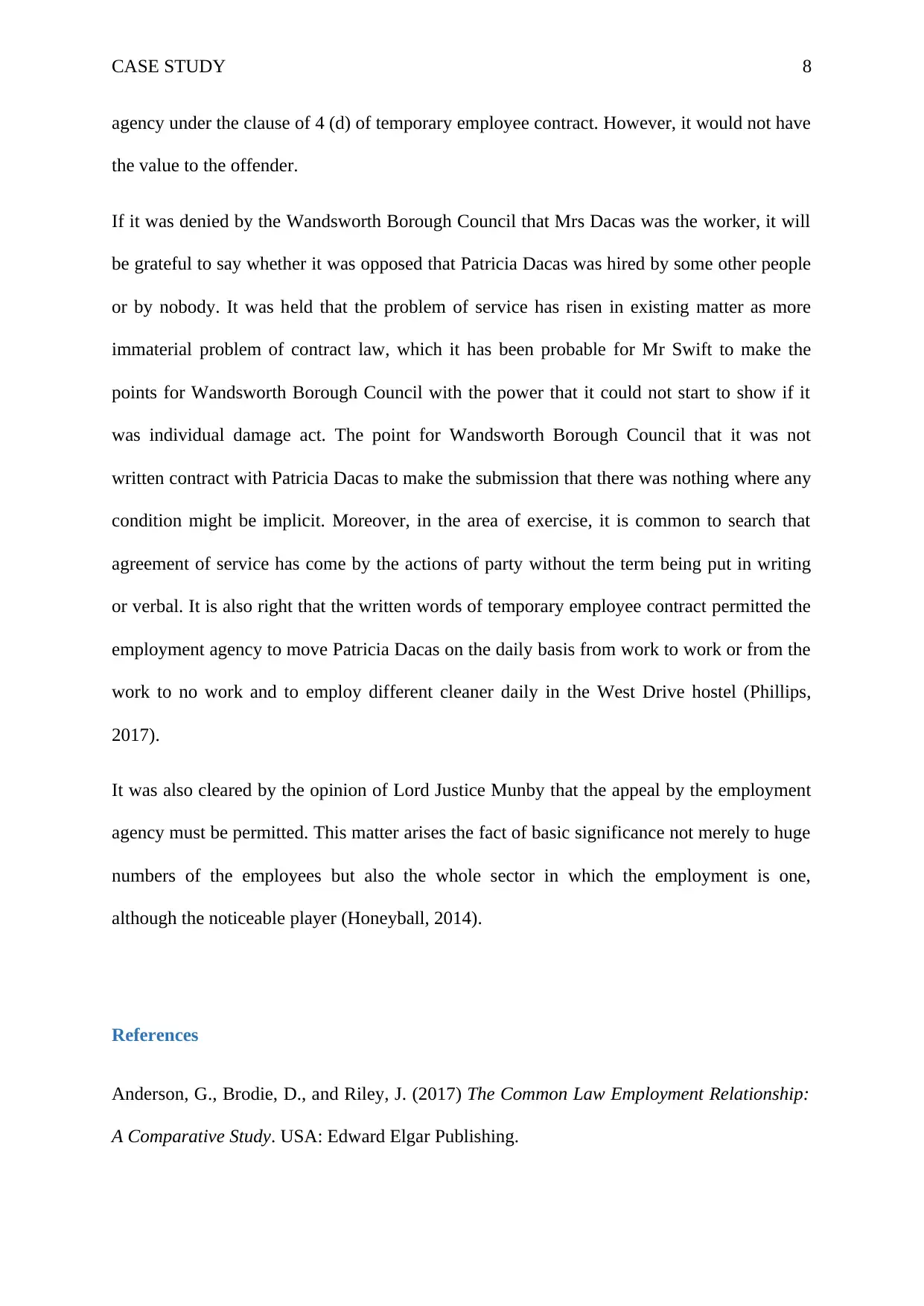
CASE STUDY 8
agency under the clause of 4 (d) of temporary employee contract. However, it would not have
the value to the offender.
If it was denied by the Wandsworth Borough Council that Mrs Dacas was the worker, it will
be grateful to say whether it was opposed that Patricia Dacas was hired by some other people
or by nobody. It was held that the problem of service has risen in existing matter as more
immaterial problem of contract law, which it has been probable for Mr Swift to make the
points for Wandsworth Borough Council with the power that it could not start to show if it
was individual damage act. The point for Wandsworth Borough Council that it was not
written contract with Patricia Dacas to make the submission that there was nothing where any
condition might be implicit. Moreover, in the area of exercise, it is common to search that
agreement of service has come by the actions of party without the term being put in writing
or verbal. It is also right that the written words of temporary employee contract permitted the
employment agency to move Patricia Dacas on the daily basis from work to work or from the
work to no work and to employ different cleaner daily in the West Drive hostel (Phillips,
2017).
It was also cleared by the opinion of Lord Justice Munby that the appeal by the employment
agency must be permitted. This matter arises the fact of basic significance not merely to huge
numbers of the employees but also the whole sector in which the employment is one,
although the noticeable player (Honeyball, 2014).
References
Anderson, G., Brodie, D., and Riley, J. (2017) The Common Law Employment Relationship:
A Comparative Study. USA: Edward Elgar Publishing.
agency under the clause of 4 (d) of temporary employee contract. However, it would not have
the value to the offender.
If it was denied by the Wandsworth Borough Council that Mrs Dacas was the worker, it will
be grateful to say whether it was opposed that Patricia Dacas was hired by some other people
or by nobody. It was held that the problem of service has risen in existing matter as more
immaterial problem of contract law, which it has been probable for Mr Swift to make the
points for Wandsworth Borough Council with the power that it could not start to show if it
was individual damage act. The point for Wandsworth Borough Council that it was not
written contract with Patricia Dacas to make the submission that there was nothing where any
condition might be implicit. Moreover, in the area of exercise, it is common to search that
agreement of service has come by the actions of party without the term being put in writing
or verbal. It is also right that the written words of temporary employee contract permitted the
employment agency to move Patricia Dacas on the daily basis from work to work or from the
work to no work and to employ different cleaner daily in the West Drive hostel (Phillips,
2017).
It was also cleared by the opinion of Lord Justice Munby that the appeal by the employment
agency must be permitted. This matter arises the fact of basic significance not merely to huge
numbers of the employees but also the whole sector in which the employment is one,
although the noticeable player (Honeyball, 2014).
References
Anderson, G., Brodie, D., and Riley, J. (2017) The Common Law Employment Relationship:
A Comparative Study. USA: Edward Elgar Publishing.
⊘ This is a preview!⊘
Do you want full access?
Subscribe today to unlock all pages.

Trusted by 1+ million students worldwide
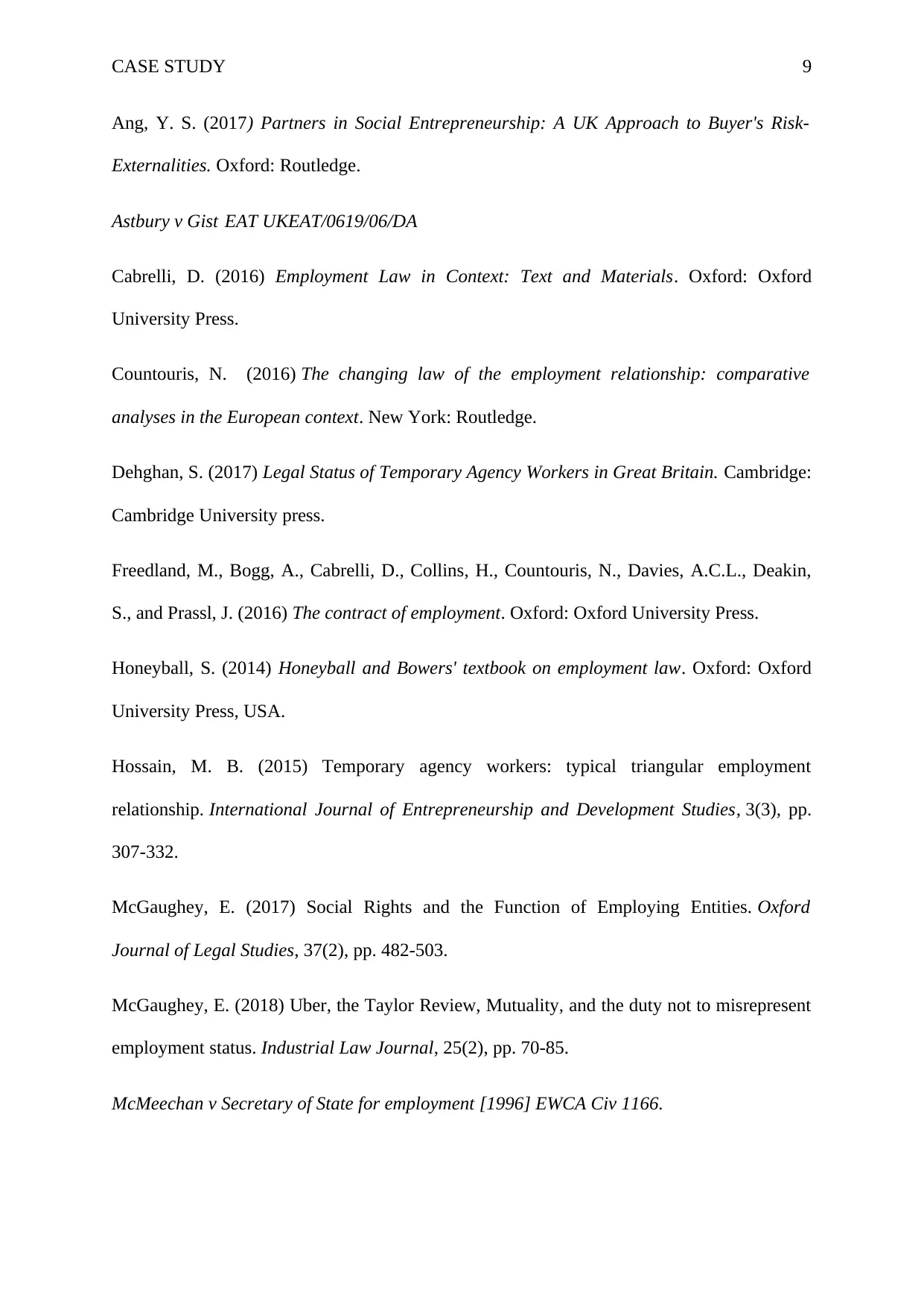
CASE STUDY 9
Ang, Y. S. (2017) Partners in Social Entrepreneurship: A UK Approach to Buyer's Risk-
Externalities. Oxford: Routledge.
Astbury v Gist EAT UKEAT/0619/06/DA
Cabrelli, D. (2016) Employment Law in Context: Text and Materials. Oxford: Oxford
University Press.
Countouris, N. (2016) The changing law of the employment relationship: comparative
analyses in the European context. New York: Routledge.
Dehghan, S. (2017) Legal Status of Temporary Agency Workers in Great Britain. Cambridge:
Cambridge University press.
Freedland, M., Bogg, A., Cabrelli, D., Collins, H., Countouris, N., Davies, A.C.L., Deakin,
S., and Prassl, J. (2016) The contract of employment. Oxford: Oxford University Press.
Honeyball, S. (2014) Honeyball and Bowers' textbook on employment law. Oxford: Oxford
University Press, USA.
Hossain, M. B. (2015) Temporary agency workers: typical triangular employment
relationship. International Journal of Entrepreneurship and Development Studies, 3(3), pp.
307-332.
McGaughey, E. (2017) Social Rights and the Function of Employing Entities. Oxford
Journal of Legal Studies, 37(2), pp. 482-503.
McGaughey, E. (2018) Uber, the Taylor Review, Mutuality, and the duty not to misrepresent
employment status. Industrial Law Journal, 25(2), pp. 70-85.
McMeechan v Secretary of State for employment [1996] EWCA Civ 1166.
Ang, Y. S. (2017) Partners in Social Entrepreneurship: A UK Approach to Buyer's Risk-
Externalities. Oxford: Routledge.
Astbury v Gist EAT UKEAT/0619/06/DA
Cabrelli, D. (2016) Employment Law in Context: Text and Materials. Oxford: Oxford
University Press.
Countouris, N. (2016) The changing law of the employment relationship: comparative
analyses in the European context. New York: Routledge.
Dehghan, S. (2017) Legal Status of Temporary Agency Workers in Great Britain. Cambridge:
Cambridge University press.
Freedland, M., Bogg, A., Cabrelli, D., Collins, H., Countouris, N., Davies, A.C.L., Deakin,
S., and Prassl, J. (2016) The contract of employment. Oxford: Oxford University Press.
Honeyball, S. (2014) Honeyball and Bowers' textbook on employment law. Oxford: Oxford
University Press, USA.
Hossain, M. B. (2015) Temporary agency workers: typical triangular employment
relationship. International Journal of Entrepreneurship and Development Studies, 3(3), pp.
307-332.
McGaughey, E. (2017) Social Rights and the Function of Employing Entities. Oxford
Journal of Legal Studies, 37(2), pp. 482-503.
McGaughey, E. (2018) Uber, the Taylor Review, Mutuality, and the duty not to misrepresent
employment status. Industrial Law Journal, 25(2), pp. 70-85.
McMeechan v Secretary of State for employment [1996] EWCA Civ 1166.
Paraphrase This Document
Need a fresh take? Get an instant paraphrase of this document with our AI Paraphraser
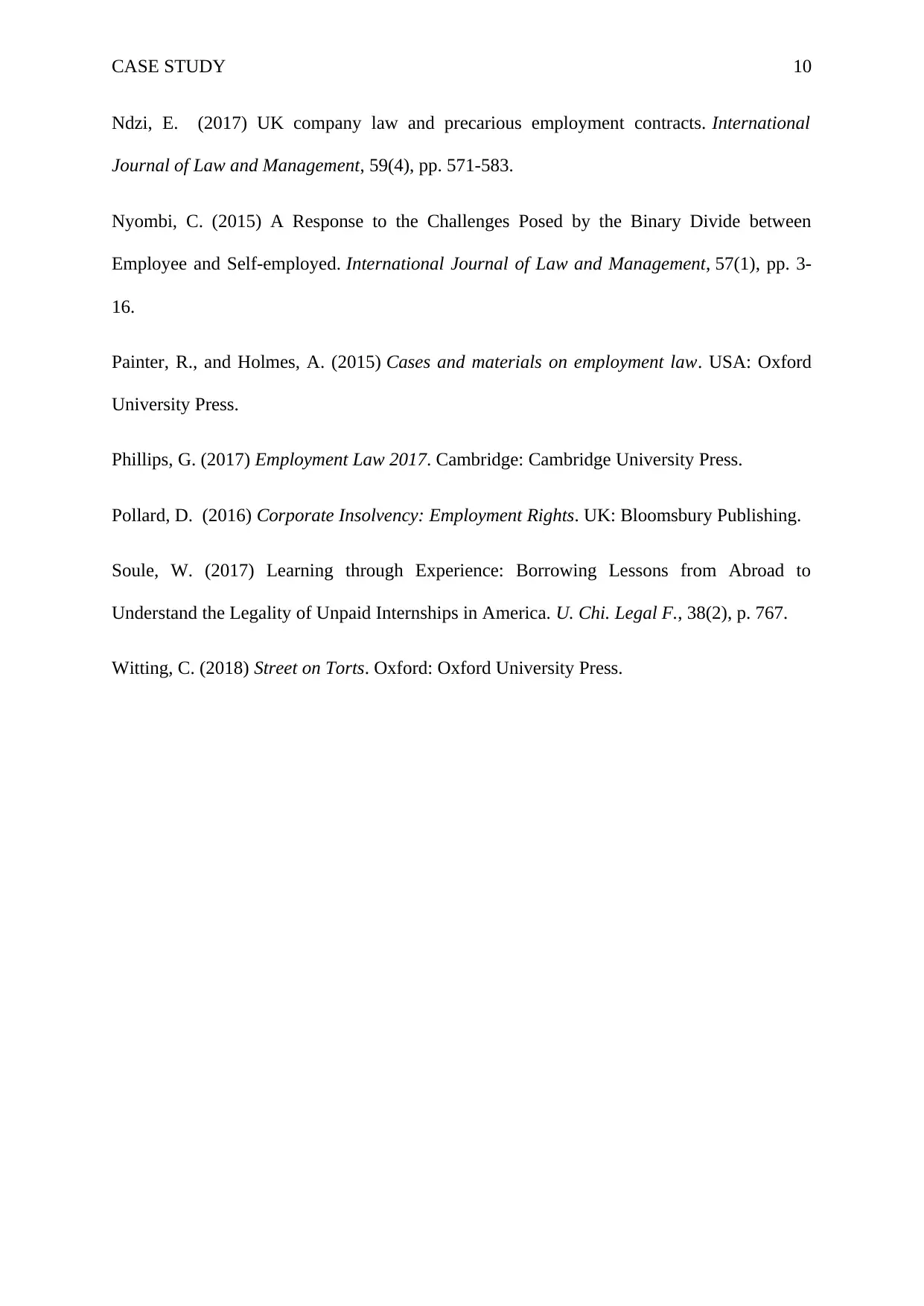
CASE STUDY 10
Ndzi, E. (2017) UK company law and precarious employment contracts. International
Journal of Law and Management, 59(4), pp. 571-583.
Nyombi, C. (2015) A Response to the Challenges Posed by the Binary Divide between
Employee and Self-employed. International Journal of Law and Management, 57(1), pp. 3-
16.
Painter, R., and Holmes, A. (2015) Cases and materials on employment law. USA: Oxford
University Press.
Phillips, G. (2017) Employment Law 2017. Cambridge: Cambridge University Press.
Pollard, D. (2016) Corporate Insolvency: Employment Rights. UK: Bloomsbury Publishing.
Soule, W. (2017) Learning through Experience: Borrowing Lessons from Abroad to
Understand the Legality of Unpaid Internships in America. U. Chi. Legal F., 38(2), p. 767.
Witting, C. (2018) Street on Torts. Oxford: Oxford University Press.
Ndzi, E. (2017) UK company law and precarious employment contracts. International
Journal of Law and Management, 59(4), pp. 571-583.
Nyombi, C. (2015) A Response to the Challenges Posed by the Binary Divide between
Employee and Self-employed. International Journal of Law and Management, 57(1), pp. 3-
16.
Painter, R., and Holmes, A. (2015) Cases and materials on employment law. USA: Oxford
University Press.
Phillips, G. (2017) Employment Law 2017. Cambridge: Cambridge University Press.
Pollard, D. (2016) Corporate Insolvency: Employment Rights. UK: Bloomsbury Publishing.
Soule, W. (2017) Learning through Experience: Borrowing Lessons from Abroad to
Understand the Legality of Unpaid Internships in America. U. Chi. Legal F., 38(2), p. 767.
Witting, C. (2018) Street on Torts. Oxford: Oxford University Press.
1 out of 11
Your All-in-One AI-Powered Toolkit for Academic Success.
+13062052269
info@desklib.com
Available 24*7 on WhatsApp / Email
![[object Object]](/_next/static/media/star-bottom.7253800d.svg)
Unlock your academic potential
Copyright © 2020–2026 A2Z Services. All Rights Reserved. Developed and managed by ZUCOL.